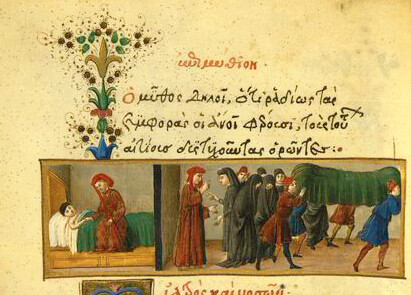Here is a round-up of today's blog posts - and for previous posts, check out the Bestiaria Latina Blog archives. I'm using Google+ a lot these days - are there any of you I should look for there?
HODIE: ante diem octavum Idus Decembres.
GAUDIUM MUNDO: Here are some Latin holiday songs for you to enjoy - O Viri, Este Hilares (a Latin version of "God Rest You Merry, Gentlemen"), Angelus ad Virginem (a widely popular Latin song of the Middle Ages), and Dies est Laetitiae (another medieval Latin hymn).
OWEN'S EPIGRAMS: The two new Owen epigrams, with Harvey's English versions, are Oculi Reipublicae, Lex et religio iunxerunt foedera, pravas / Haec hominum mentes comprimit, illa manus; and In Quendam Grammaticastrum, Grammaticus bonus, nil praeter grammata nosti. / Scis praeter literas nihil, literatus homo es. (They each come a vocabulary list!)
CAMERARIUS'S EMBLEMS: The two new emblems are Phoenix (this is actually one of Bornitz's emblems), Ut moriar, vivo, moriorque, ut postmodo vivam; / Nam cinere exusto mox redivivus ero; and Uni Salus, Alteri Pernicies, Ut rosa mors, scarabaee, tibi est, apis una voluptas: / Virtus, grata bonis, est inimica malis. (These have vocabulary too!)
VERBUM WIDGET: The word from the daily widget is DUO - which also has a brief essay at the Verbosum blog. Here's one of the sayings you can find in that essay: E duobus malis, eligendum est minus, "Choose the lesser of two evils."
GOOGLE BOOKS: Today's Google Books are Harbottle's Dictionary of Quotations and Foreign Phrases in Daily Use.
TODAY'S FABLES & STORIES:
ANECDOTE OF THE DAY: Today's anecdote is Agricola et Canis Eius, a story about a dog who saves his owner's life.
FABULAE FACILES: The NEW easy-to-read fable is Poeta et Agricola, a story about the meaning of solitude (and the fable comes with a vocabulary list).
FABULAE FACILES WIDGET: The fable from the Fabulae Faciles widget is Avarus et Poma Marcescentia, a hilarious story about a miser, his son, and an apple orchard (this one also has a vocabulary list).
MILLE FABULAE: The "chunk" of Mille Fabulae et Una today is Fable 131 through Fable 140, including Panthera et Rustici, a story about a justice-dispensing panther.
NEW MILLE FABULAE: The NEW fables with images are Remi et Clavus, a story with talking oars and a talking tiller, and Iuppiter, Terra, et Mare, a creation story involving Jupiter himself.
MILLE FABULAE WIDGET: The fable from the Mille Fabulae et Una widget is Medicus et Mortuus, a story about a doctor with 20/20 hindsight.
AESOP IN ENGLISH VERSE: Today's fable from the English verse widget is The Bear and the Fox, a story in which the fox rebukes the bear for being a hypocrite.
TODAY'S MOTTOES & PROVERBS:
3-Word Mottoes: Today's 3-word motto is Dum vivo, spero (English: While I live, I hope).
3-Word Proverbs: Today's 3-word proverb is Omnes terra sumus (English: We are all earth).
Rhyming Proverbs: Today's proverb with rhyme is: Vivamus puri, quasi simus cras morituri (English: Let us live a pure life, as if we were going to die tomorrow).
Vulgate Verse: Today's verse is Petite, et dabitur vobis (Matt. 7:7). For a translation, check out the polyglot Bible, in English, Hebrew, Latin and Greek, at the Sacred Texts Archive online.
Elizabethan Proverb Commentary: Here is today's proverb commentary, this time by Conybeare: Ede nasturtium: Is applied to a dull and a grosse person, and for as muche as Nasturtium called cresses being eaten doth make the nose tinckle, and thereby causeth the dull spirites to wake, therefore by this proverbe ys ment, pluck up thie spirites, or awake dullarde or luske.
For an image today, here is that story of the know-it-all doctor: 899. Medicus et Mortuus. Medicus aegrotum curabat. Cum hic autem obiisset, ille ad efferentes dicebat, “Vir iste, si vino abstinuisset clysteribusque usus esset, profecto minime interiisset.” Tum quidam ex iis, qui aderant, protinus respondens, “Haud nunc,” ait, “O praeclare, oportebat ista te dicere cum iuvare nihil possunt, sed tunc aegrotum de his admonere debebas, cum uti poterat.” (source)
